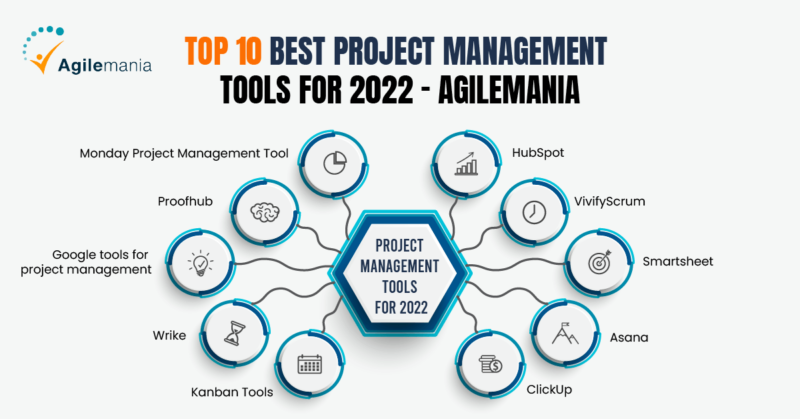
Agilemania
Agilemania, a small group of passionate Lean-Agile-DevOps consultants and trainers, is the most tru... Read more

Agilemania, a small group of passionate Lean-Agile-DevOps consultants and trainers, is the most tru... Read more

For any organization, project management tools are a necessity. As the importance of project management tools becomes more widespread, it is no surprise that there is an abundance of reliable tools on the market.
1 trillion dollars are lost due to poor project management practices, and some companies are losing even more money by being unable to keep up with their workloads.
It's no wonder that so many businesses are turning to project management tools to help them stay efficient and save time and money.
In this competitive world, it is important to have a successful project management tool. You need to ensure you have the right tool for your business.
Project management is a difficult task for companies, small and large. Managing projects can be extremely difficult and complicated.
One big problem is that people feel too intimidated even to try it. In this article, we've compiled a list of my top 10 favorite project management tools for 2023.
The Monday Project Management Tool is simple for managing and tracking your projects. It can be used to track your projects' progress, manage deadlines, and keep track of who has been assigned which tasks.
Highlights:
Pros:
Cons:
Proofhub is a project management tool that automates the tedious parts of running a business. It's designed to help you get more done in less time, so you can spend more time being productive and less time doing administrative work.
Highlights:
Pros
Cons
Agile Project management methodology is a big part of any business, but it can be especially hard to manage if you work with multiple teams.
You need to ensure that everyone on the team is on the same page about what needs to be done, how long it should take, and when it should be completed. Google tools can help you do just that.
With Google Sheets, you can create a spreadsheet that everyone on your team can access as they work on their tasks.
This means that everyone will have up-to-date information about what tasks need to be done and how long they'll take so they know exactly where they stand in terms of completing them.
This is a list of the best Google tools for project management.
G Suite is a suite of cloud-based applications that are designed to help you do your job better. It includes Gmail, Google Drive, and other tools that are designed to make work faster and easier.
Pros:
Cons:
Wrike is a project management tool that helps you organize your work, keep track of deadlines and milestones, and keep everyone in the loop. It's easy to use, so whether you're just getting started or you've been using Wrike for years, you'll be up and running in no time.
Highlights:
Pros:
Cons:
Kanban Tool is a good way to get started with agile development. With seamless time-tracking capabilities, it allows you to visualize your workflow. Using notifications, reports, and team management features, you can easily collaborate and track your tasks.
Highlights:
Pros:
Scrum Master certification empowers you to ensure product features meet user needs, leveraging Jira Software at your fingertips."
Take our knowledge test today!
Using HubSpot, you can integrate your marketing, sales, support, and project management teams.
Under the project management skill, you can manage all your tasks, files, and communications in one place with HubSpot's free Marketing Hub.
Your projects can all be managed within the same software with real-time feedback, notifications, and results.
Manage your projects instantly with built-in templates. Assign owners to each task, set due dates, and provide any attachments or assets necessary for every project.
Because it's part of HubSpot's CRM, all your marketing, sales, and support data will be connected.
Highlights
Pros:
Cons:
Multiple projects can be managed using this web-based agile project management tool.
Highlights:
Pros:
Cons:
Smartsheet is project management software designed to simplify management professionals' jobs.
It has many capabilities enable you to automate workflows, manage tasks, and enhance team communication while providing real-time visibility into active projects.
It also provides tools for tracking the development of a work in real-time as it progresses from its original intention to its final completion.
Aside from that, you receive tools for tracking budgets, managing resources across several departments, and visualizing your project's vision, plan, and timeline using relevant charts and boards.
Highlights:
Pros:
Cons:
A project management tool called Asana helps teams organize every aspect of projects inside a business. Asana allows you to arrange your work in the most efficient way possible. It is adaptable enough to your needs.
Highlights:
Pros:
ClickUp is a platform for process, task, and time management hosted in the cloud. It is simpler to manage projects, people, resources, roadmaps, documents, and wikis with templates.
Highlights:
Pros:
So, to manage all these project management tools, we need a good project manager. There are many attributes that a SAFe product manager must have in order to be successful.
They must be organized, efficient, and good at managing people and resources. A good project manager can also think outside the box and come up with creative solutions to problems.
A project manager must also be able to communicate effectively. They need to be able to clearly explain their vision for a project and convey instructions to those working on it.
They should also be good at handling conflict and resolving issues that arise during a project. If you want to be a successful project manager, you need to possess all of these qualities.
If you can master them, you'll be well on your way to leading successful projects! An agile project manager plans, leads, organizes, and motivates agile project teams.
They aim to achieve high quality and performance and deliver an agile project that provides exceptional business value to users. Adopting an Agile Approach to Project Management Deliver projects with the highest level of performance and quality as an Agile project manager.
Agilemania, a small group of passionate Lean-Agile-DevOps consultants and trainers, is the most trusted brand for digital transformations in South and South-East Asia.
WhatsApp Us
We will get back to you soon!
For a detailed enquiry, please write to us at connect@agilemania.com
We will get back to you soon!
For a detailed enquiry, please write to us at connect@agilemania.com

